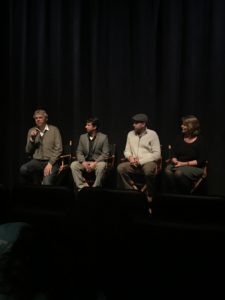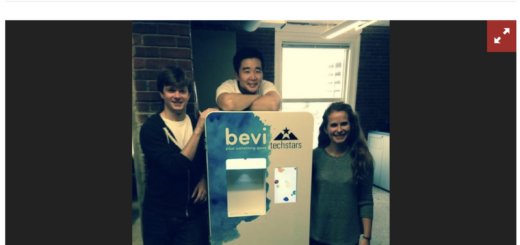Finding Oscar
“John, do you want the good news or the bad news first?”
“Always the bad…”
“Valentina dropped by a little while ago. She gave us her new social security number and her new name. Just wanted to make sure you were aware.”
My brows lifted just enough to allow my eyeballs to protrude a few millimeters from their sockets. This couldn’t possibly be happening again, I thought.
Valentina. One of Boloco’s happiest, most committed General Managers. Valentina. Who I knew personally and trusted. Valentina wasn’t actually.. Valentina? Who was she?
The system had been loose since we started in 1997. Back then, we didn’t even know what to look for when checking IDs before hiring someone. The process of hiring while ensuring legality as it turned out was – and still is – pretty straightforward. Two forms of valid ID, a properly completed I-9 Form (one of the simplest forms I’ve ever laid eyes on), submit the information to the payroll company (who then sends it to the governmental powers at large), and get to work*. From time to time, after a new Boloco team member started, we might hear a rumor that this same someone was undocumented. Illegal. Didn’t have the right papers. We’d debate it – endlessly it felt, due to the humanitarian conflicts involved – confront the person, and then they’d have to go… mostly. It turned out, not always, just mostly. Sometimes they’d stay, I later learned, so long as I had not been told about it. People came to know that if I knew what everyone else knew, if I were to learn the truth, there was no legal choice but to terminate. When I didn’t know, the humanitarian argument prevailed.
Now I knew the truth. And Valentina had to go. I was sad. She had one of our top 10 smiles and a huge heart. Guests loved her.
—
Fast forward a few years to one colorful fall day in 2012. Like any other day, another 200 emails crossed my laptop. A few of them got my attention, but one more than the rest.
From: “Greathead, R. Scott”
Date: October 6, 2012, 1:48:14 PM EDT
Subject: Óscar RamírezI am Óscar Ramírez’s lawyer. I have been representing Óscar since August 2011, when we discovered that as a 3-year-old, in December 1982, he was a survivor of the Dos Erres massacre in Guatamala, an incident in which a Guatemalan army unit murdered his mother and eight siblings along with virtually everyone else living in his village. Óscar survived the massacre because he was kidnapped by a Guatemalan lieutenant, who gave him to his mother to raise, telling her the boy was his by a woman who did not want him. The lieutenant died in 1983, without telling his mother where Óscar really came from. Óscar grew up with no conscious memory of the massacre, believing he was the lieutenant’s son until the results of a DNA test established who he really was.
On Óscar’s behalf, last December, we submitted to the U.S. Citiizenship and Immigration Services of the Department of Homeland Security an application for political asylum in the United States, which was granted a few weeks ago.
At that time, Óscar became eligible for employment authorization, pursuant to which he was issued a new Social Security number. It is that number that he has presented to Boloco.
I understand you have questions about this, and I am available to answer them. I am available to talk to either of you or with Boloco’s employment counsel at any time.
Óscar’s story is a remarkable one, and has received a considerable amount of media attention. You can hear it told on the NPR radio program “This American Life” at this link: http://www.thisamericanlife.org/radio-archives/episode/465/what-happened-at-dos-erres, and you can read it as reported by ProPublica at this link: http://www.propublica.org/series/finding-oscar.
Best, Scott
Scott Greathead
Wiggin and Dana LLP
A note from Boloco Human Resources followed soon after:
John,
I wanted to keep you informed about a situation with Oscar Ramirez (Natick). Last week Oscar presented a new I-9 form with a new social security # and new documents for verification. Unlike the past similar situations, Oscar’s situation seemed different.
I responded soon after, with the required copy to lawyers and our PR team:
There may only be a matter of minutes between the time these stories hit mainstream media and the time people connect the dots to his full-time job at Boloco.
We need to remember our mission. We positively impact our peoples’ lives. Bold practices.
Regardless of where this goes… we should get IN FRONT of this and not have to REACT to it. I’d prefer to figure out a way to CELEBRATE Oscar, taking risk with celebration in mind instead of hiding behind legal curtains, etc.
One thing… because of the forced dishonesty that many foodservice workers have to deal with, we should probably make everyone who has been with us for any amount of time take the E-Verify test… we already test all new people, but this situation forces our hand. In addition, we need to know if anything we’ve ever done with Oscar has been less than the letter of the law, and be ready to be very up front with the truth. Did we conduct I-9 audits properly, did we verify his papers to the letter of the law? I’d like to see an I-9 audit for the whole company conducted asap. I’m praying we haven’t slipped on this discipline that began over 7 years ago.
The bottom line beyond all of this… very, very, very happy for Oscar.
Later, another email from Greathead trying to set up a time to talk with me that evening . We tried to connect. We kept missing, back and forth as email tends to do. No evidence exists that we did talk and I honestly don’t remember.
It went dead from there.
A year later, to the day, I left Boloco. Here’s that story.
More years went by. I bought back Boloco in 2015 and returned as CEO. Oscar left Boloco, too. He came back like I did. He and I left and then we came back. We were living our own versions of a new reality.
Oscar was now a protected individual in the US workforce and I was happy to know he had returned to Boloco. He had worked in Natick previously, but now he was helping our Wellesley location. Customers loved him. And now that fateful email from Scott Greathead – the one that got everyone so worked up – had seemingly overnight – 3 years – turned itself into a Steven Spielberg produced documentary.
Why had I not taken it as seriously when I first heard the story, I wondered. Why did the fact that Steven Spielberg was now involved cause me to give it more attention? Why did it become front page news in my mind, but hadn’t been front page when I first heard about it? I observed my own reactions to these revelations. I even scolded myself for, dare I admit this, feeling a tinge of desire to be closer to Oscar now that it had a chance of reaping fame and fortune. Yuck. But then again, that’s what humans are. I see this happen every day. Yucky. Human. I recognized the thoughts and then let them pass.
Sometime earlier this year I downloaded the audio version of the book that was the basis of the documentary. A trip to Boston and back in my Jeep Rubicon vibrated by quickly as I digested with horror the atrocities that human beings are capable of – the atrocities that ultimately saw Oscar’s mother and 8 siblings violently raped, murdered, and pitched into a well where grenades were intermittently tossed to make room for nearly 250 corpses. The Guatemalan army wiped out literally the entire town of Dos Erres. This all took place when I was 12 or 13… around the same exact time I traveled from Belgium where we lived at the time to Kenya with the whole family. If Kenya was safe, I thought as a young teenager, could anywhere really not be safe in such a modern, “enlightened” age? Sadly… I didn’t know about the massacres in Guatemala until Oscar’s letter first came through. And in all honesty, in the time between receipt of that letter in 2012 and finally reconnecting with Oscar in 2017, it still wouldn’t have registered in a memorable way. How easily we dismiss from our minds even the most tragic human events when they don’t take place in our own back yards or affect those we know or love.
Oscar sent me the schedule of screenings earlier this spring. By now I knew there was little I could do to help – though I offered anyway just in case. Oscar said he’d be in Hanover, NH on Friday, May 5, 2017 for a screening of Finding Oscar at the Black Center at Dartmouth College. I made four reservations for myself, Maggie, Tibby (13) and Izzy (11).
That evening we joined about 80 others and took spots near the front of the theatre. What unfolded on the screen was hard to comprehend. Lots of bones and corpses shown during lengthy exhumations with appropriately gloomy, murder-mystery style music accompanying the images. Izzy hid her face in Maggie’s shoulder for most of the first half, declaring over and over again that she was leaving and would meet us at Boloco. I was thinking at the time how ironic that kids can handle violence in movies in ways we couldn’t have fathomed in the 70’s and 80’s and yet any tie to real life and they shudder. Perhaps we don’t give them enough credit for being able to separate fiction and make believe from real life. Maybe violence on TV is so obviously fake that it isn’t as bad as we adults assume? No answers, just passing thoughts as I watched committed Guatemalan authorities search for the truth… and ultimately search for Oscar, one of the two boys who escaped the massacre.
Soon, Oscar was found. In Framingham, Massachusetts. Because of his light skin and bright eyes, we learned during the Q&A that he crossed into the United States, without documentation, quite easily. He lived in fear of being caught for years, of being pulled over by the police, but he never was. His soon-to-be wife, known as La Flaca (the “skinny one”) back home, joined him a bit later and they built a life and a beautiful family in suburban Boston.
I felt myself brace a bit when the camera shifted to Oscar in his car en route to work. The “boloco” hat was unmistakable to not just me, but also to every person in the audience who knew Hanover. Some of them must have been wondering how a local Hanover business could be entangled in such a story. But what was impossible to escape was the direct connection between Oscar’s illegal status and his working at Boloco. I suddenly became very aware of the balding spot on the back of my head – assuming everyone was looking at it – and the fact that my daughters had missed that link and were smiling so broadly and pointing at me that it felt like they thought I was now a movie star… and perhaps through association they were too. That fame and fortune thing hard at work once again…
From 1997 to 1999 we were completely loose with paperwork. We did our best, but any so-called “I-9 audit” by the authorities would have set us back thousands of dollars in fines. We were just unaware that we were doing anything wrong, or right for that matter… mainly because we were hiring and onboarding as well as any other local restaurant chain out there. From 1999 to 2004 Barbara Freitas stepped in as HR manager and put us in line somewhat. Not sure we would have passed an I-9 audit with flying colors, but we would have gotten a solid B. It wasn’t until Mike Harder showed up as President & COO in early 2005 with about 25 years of experience that we got our shit together finally. Stings were happening more frequently as George W’s term as president neared an end. While we had always followed the letter of the law, the letter of the law didn’t mean that people didn’t slip in. We chose not to play “Immigration Officials of the United States”… and we chose not to treat people who appeared to be from different countries any differently than those who were clearly from East Boston, Wellesley, or any town New Hampshire or Vermont.
In 2011, that all changed. We switched to digital onboarding with an innovative company called People Matter. Good bye paper forms. Hello electronic paperwork and, along with that, a new layer of screening for legal status. We decided not to go retroactive – we weren’t on a witch hunt – but the number of new applicants automatically booted from eligibility rose quickly. I was satisfied, as was our team, and our investors, and we were suddenly more “responsible” than all but a few reputable larger companies.
Oscar had now arrived at work – the Boloco located in tony Wellesley, Massachusetts. There he was at handoff, smiling at guests, and doing what Oscar did best. My bald spot was still tingling. The smiles on Tibby’s and Izzy’s faces were continuing to grow wider.

I felt proud and guilty at the same time. Should I have demanded more stringent systems in our earlier years? Was I to be commended or scolded (or fined?) for having been one of the employers who let “illegals” take jobs from our own? Maggie’s hand squeezed mine. She understood a dilemma was in the works, even if it was just in my own mind and nobody elses, without even looking at me.
The movie ended. Oscar and his real father were reunited in the US for the first time since that horrible scene in Dos Erres over 30 years ago.
The Q&A followed. It ended. It was great to reunite with Oscar and say hi. From my questions of him (I was nicely asked to stop asking questions) he could probably tell I was concerned about others in his former position. As horrific as his experience had been, it occurred to me, he had not actually been aware of it. Ever. In some ways, perhaps, he was experiencing it like all of us were… as an observer. He still has no recollection of any of it. He is likely the better for it, given that the other slightly older boy does remember and seemed to struggle. Oscar is in a unique position where a circumstance he had not chosen nor ever known about gives him a powerful and less emotionally-charged pulpit to spread the word, to visit audiences, to share the lessons.
In less than two years he will very likely become a full-fledged US citizen. He is working as a tradesman and has joined a union in Boston and is earning very good pay, he tells me. I’m sad that he won’t work for Boloco anymore because he was so good with people, especially our customers… but I’m happy that his beautiful family is the better for this discovery and this movie. They are not only safe and doing relatively well, they now have a purpose to share Oscar’s story. To help thwart more Dos Erres-like disasters around the world – even as they sadly do continue to happen – by bringing light to its very possibility.
—




Recent Comments